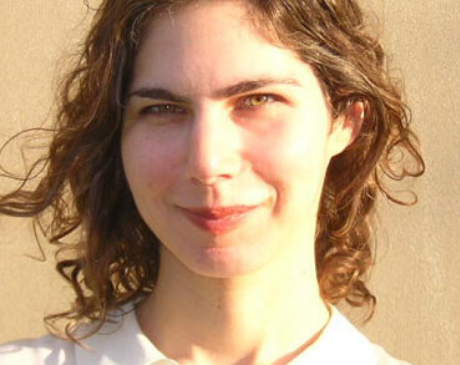On Poetry
On Politics: Karen Volkman

Past Paraphrase
Osip Mandelstam disliked paraphrase. How ironic, then, that he has become an emblem: the iconic poet of integrity and privacy destroyed by a totalitarian system. This is true, and terrible, but it is a paraphrase, guilty of all the impoverishing reduction Mandelstam so adamantly opposed. Written in 1933, four years before the poet's imprisonment and death, his "Conversation About Dante" is a fascinating document of this resistance. Discussing a work renowned for its monumental architecture and affirmation of hierarchy, Mandelstam instead celebrates in Dante the disruption and deformation of structure. His medium: conversation and its mutable motion.
"You could not keep my lips from moving," writes Mandelstam in one late poem. Speech fed his writing. He composed out loud, attentive to each nuance of vocal quality, and insisted that Dante was meant to be recited, acquiring new dimensions of meaning in enunciation. In contrast to the constrained conditions of the Stalinist era, in which anyone could be an informer and all conversation was tainted, circumscribed and suspect, conversation throughout The Comedy is the impetus to movement—this "journey with conversations" is a trajectory of talk. The Pilgrim's knowledge is acquired through discussion, largely with his guides, Virgil and Beatrice, but even his enemies are obliged to help him in telling their tales, contributing to his upward spiral along the path of enlightenment. The persecuted Mandelstam is acutely aware of the Pilgrim's constraint in voicing questions, characterizing them as "hatched" by the two successive mentors, who sense again and again his winging impulse, the thought-bird.
Speech, sensual and material, lives by travel. Like poetry, discourse is a journey of shifts and turns. "The step, linked with breathing and saturated with thought, [he] understood as the beginning of prosody. . . In Dante poetry and philosophy are constantly on the go. Even a stop is but a variety of accumulated motion. . . . The metrical foot is the inhalation and exhalation of the step." This movement is purposeful, transformative and future-seeking, cross-breeding elements and species: from the hatched bird grows the speech-fruit, the earthbound step from saturate thought. When matter disappears in The Paradiso, speech continues, and Mandelstam names Dante's new hybrid "phonetic light." "How many shoe soles, how many oxhide soles, how many pairs of sandals did Alighieri wear out during the course of his poetic work?" The step measures prosodic pace, but the poem contains other time-realms. Mandelstam complicates chronological cycles with alternate measures—the clock of etymology, mineral weather, Dante's synchronic fabrications, all ignited in the "instinct for form creation" which exceeds and extends syntactic coordinates. At these speeds, sentence structure is subsumed, leaving "merely a magnetized impulse." But in Mandelstam's taxonomy, Dante's greatest mutant species is a kind of poetic anti-matter machine, canceling by accretion: enter "the Heraclitean metaphor; it so strongly emphasizes the fluidity of the phenomenon and cancels it with such a flourish, that direct contemplation, after the metaphor has completed its work, is essentially left with nothing to sustain it."
Jane Gary Harris, editor and co-translator of Mandelstam's collected critical prose, suggests Andrey Bely as the silent partner of the conversation. A writer of intricate prose (and unremarkable poetry), whose 1916 masterpiece, Petersburg, weaves terrorist plots and paranoia, Bely himself occupied a peculiar position in the restructured hierarchy. Half Symbolist, mystical dandy, half hallucinatory satirist, he was a major prose innovator and a main proponent of the dense textured style known as Ornamentalism. Petersburg is an early 20th century riff on the damned city visions of Pushkin, Gogol, Dostoevsky, and Mandelstam—who in his own poems christens Petersburg "transparent Petropolis"—posits Hell as a nebulous, toxic city, spectral Florence: "like an epidemic, an infectious disease or the plague, it spreads like a contagion, even though it is not spatial." Through Bely, an entire lineage joins in as interlocutors. The ornamental and the excessive are another point of contact with Bely, as Mandelstam notes another form of Dantean transmutation— the image as agitated energy, irreducible pure propulsion. "Dante is by his very nature one who shakes up meaning and destroys the integrity of the image. The composition of his cantos resembles an airline schedule or the indefatigable flight of carrier pigeons." Mandelstam insists on the value of surplus in Dante's imagistic strings; essential BECAUSE dispensable, the superfluous takes on value "in direct proportion to our ability to do without it." The Dostoevskian "superfluous man" lurks in these words, as do his real-life Soviet counterparts, the intellectual, the artist, the kulak. Here excess becomes exactly the value of form-making—the poet as augmenter of volumes, instigator of increase, a force of nature—"Ornament is good precisely because it preserves traces of its origin like a piece of nature enacted."
It should be remembered that Mandelstam never rejected the values of the Revolution. In Nadezhda Mandelstam's memoir Hope Against Hope, his wife speaks of the romance of the word and the devotion it compelled from so many in the midst of the harshest persecution. The poet's fascination with Dante's animating of impulse and energy, the poesis of "phonetic light" and crystal complex structures, shows him linking the great writer to the same spirit of aesthetic exuberance that characterized the years preceding and following 1917—and to the darker, more anguished impulse that shaped his late poems. While Mandelstam never adopted the radical style of a Mayakovsky or Khlebnikov—virtually all of his poetry is rhymed and metrically regular, a fact often buried in English translations—the poems perform astonishing upheavals, cataclysmic resistances, within their taut constraints. Joseph Brodsky describes the late poems of the Moscow and Voronezh Notebooks as "an incredible psychic acceleration," a "honing of speeds." Mandelstam's scornful dismissal of Dante's interpretation in overtly political or theological terms, his insistence that such concerns were merely a frame for the "instinct for form-creation," could be taken simply as a rejection of the content-based prescriptions of Socialist Realism. Or even more simply, as justified caution. The poet demands we resist these reductions. Apparent, certainly, is his empathy for the medieval exile adrift in political corruption. But the interlacing of these two poetic velocities outpaces parallels; it cries for collaboration, for a dynamic launching of the fluid, unstable form underlying the circumscriptions of structure. Traces of this insurgence inhere in a human and artistic conversation accomplished across centuries and space, in the tangle of speech-roots that grow and reach. "What distinguishes poetry from automatic speech is that it rouses us and shakes us into wakefulness in the middle of a word. Then it turns out that the word is much longer than we thought, and we remember that to speak means to be forever on the road."
Originally published in Crossroads, Fall 2000.

